|
|
|
Sort Order |
|
|
|
Items / Page
|
|
|
|
|
|
|
| Srl | Item |
| 1 |
ID:
140346
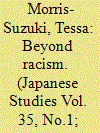

|
|
|
|
|
| Summary/Abstract |
The special issue ‘Rethinking Race and Racism from Japanese Experiences’ explores how racism operates in modern Japan. This article contributes to that exploration by examining how racism is situated within a nexus of interrelated forms of discrimination and marginalization. In the article I propose the notion of ‘semi-citizenship’ as one framework which can help us to go beyond unfruitful zero-sum-game visions of marginalization put forward by racist groups such as the Zaitokukai in Japan. Rather than envisioning a dichotomous contrast between ‘citizen’ and ‘non-citizen’, the idea of semi-citizenship allows us to think of a range of different sets of social positions stretching towards the idealized vision of the ‘full citizen’. We can then start to consider how such social positions are distributed within modern societies, how they are influenced by factors such as ethnicity, gender and physical and mental attributes, and how the distribution changes over time. This approach offers a common ground on which various kinds of marginalization may be related and understood together, potentially providing a basis for collaborative work to create a more equitable Japanese society.
|
|
|
|
|
|
|
|
|
|
|
|
|
|
|
|
| 2 |
ID:
126982
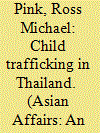

|
|
|
|
|
| Publication |
2013.
|
| Summary/Abstract |
"Child Trafficking in Thailand: Prevention and Prosecution Challenges" examines the deep rooted problem of child trafficking in Thailand and the systemic realities of marginalization, corruption, low police training and salaries and poverty that have led to ineffective law enforcement against traffickers.
|
|
|
|
|
|
|
|
|
|
|
|
|
|
|
|
| 3 |
ID:
178902
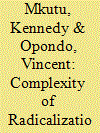

|
|
|
|
|
| Summary/Abstract |
Al-Shabaab, the East-African affiliate of Al Qaeda has carried out a number of large-scale devastating attacks in the region and a steady stream of smaller scale ones. In recent years Al-Shabaab’s ongoing strength has relied upon its ability to build local support within Kenya. This work looks at Kwale County on Kenya’s coast and examines some of the factors involved in radicalization and/or recruitment into the group, including economic hardship, historical marginalization, land injustices, drugs, problems at the family level and poor relationships with state security agencies. It highlights the more recent phenomenon of those returning from fighting with Al-Shabaab and the problems of their reintegration. It concludes that there are a number of phenomenon related in complex and sometimes self-perpetuating ways which all need to be considered in the response to radicalization and recruitment.
|
|
|
|
|
|
|
|
|
|
|
|
|
|
|
|
| 4 |
ID:
133427


|
|
|
|
|
| Publication |
2014.
|
| Summary/Abstract |
Based on anthropological field work in southeastern Nigeria, this paper explores the public concerns and everyday experience of corruption in a society still living with the legacies of the Biafran secession attempt. The paper shows how the revival of Igbo nationalism and resentment over perceived marginalisation is fuelled by perceptions that the corrupt machinery of the federal government runs against the interests of the Igbo people, and funnels resources away from the southeast as punishment for the failed separatist struggle more than 40 years ago. Hence, complaints about corruption are used to critique the Nigerian state and other regional or ethnic groups, but they also figure in an internally focused critique by Igbos of their own complicity in Nigeria's endemic corruption.
|
|
|
|
|
|
|
|
|
|
|
|
|
|
|
|
| 5 |
ID:
164691
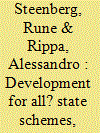

|
|
|
|
|
| Summary/Abstract |
The past decade of development schemes has been experienced very differently by various groups within the city of Kashgar in the Xinjiang Uyghur Autonomous Region of China. The recent exacerbation of social inequalities, stratification, and tensions in Kashgar is a structural consequence of two phases of government policies: an accelerated formalization of the economy and remodelling of the city-scape as part of modernistic development implemented before 2014, followed by a phase of strong securitization. Based on long-term ethnographic fieldwork between 2009 and 2017, this paper analyzes the situation, reactions, and strategies of different groups of Uyghur residents of Kashgar to cope with the changing socio-economic and political environment.
|
|
|
|
|
|
|
|
|
|
|
|
|
|
|
|
| 6 |
ID:
080896
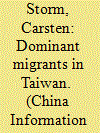

|
|
|
|
|
| Publication |
2008.
|
| Summary/Abstract |
Taiwan has a remarkable history of immigration. Most of the people in Taiwan today can be regarded as descendants of migrants who arrived in a number of major migration waves. In the course of the cultural studies project, migration of newcomers is often dealt with in terms of marginalization and vulnerability of migrants. The case of Taiwan, however, differs from that matrix since it had always been the migrant groups who after an exceptionally short time obtained a dominant position on the island. It is a truism that the heritage of migration continues to influence the society's self-awareness. Additionally, Taiwan as a de facto independent entity is a "new nation"-like Singapore or Israel-and it faces severe problems in determining its national identity at the borderline of external and internal challenges. The article analyzes the Taiwanese identity debate under the framework of migration issues and its strategic use of the postmodern discourse of marginalization. Both contribute to some features in the Taiwanese quest for identity. These features consist of the very specific mixture of political, ethnic, linguistic, and cultural aspects, the borders of inclusion and exclusion in the construction of a Taiwanese "we," and the intransigence of the debate. The specific migrant heritage of Taiwan and an evolving perception of "suffering" ( ) will be employed to explain these traits
|
|
|
|
|
|
|
|
|
|
|
|
|
|
|
|
| 7 |
ID:
107223


|
|
|
|
|
| Publication |
2011.
|
| Summary/Abstract |
This paper examines perceptions of the state by urban Muslim artisans in India. Through ethnographic analysis, I focus on the life and work trajectories of two artisans whose perceptions and experiences of the state differ widely. The common thread running through each artisan's experience is that their engagement or disengagement with the state produces subjectivities that are both deemed authentic. One artisan's involvement with the state serves to authenticate not only her skills and craftsmanship but also her sense of self, while another artisan's refusal to engage with the state authenticates his work and sense of self because of his experience of the state as corrupt. I am particularly interested in how state-issued documents, such as the certificate conferred to winners of the national awards for highly skilled artisans and the artisan identification card, are perceived as legitimate or illegitimate based on ideals of what it means to be an authentic artisan. This paper also examines how conceptualizations of the margins through the medium of documents can provide alternate ways of understanding experiences of the state.
|
|
|
|
|
|
|
|
|
|
|
|
|
|
|
|
| 8 |
ID:
107224


|
|
|
|
|
| Publication |
2011.
|
| Summary/Abstract |
This paper examines perceptions of the state by urban Muslim artisans in India. Through ethnographic analysis, I focus on the life and work trajectories of two artisans whose perceptions and experiences of the state differ widely. The common thread running through each artisan's experience is that their engagement or disengagement with the state produces subjectivities that are both deemed authentic. One artisan's involvement with the state serves to authenticate not only her skills and craftsmanship but also her sense of self, while another artisan's refusal to engage with the state authenticates his work and sense of self because of his experience of the state as corrupt. I am particularly interested in how state-issued documents, such as the certificate conferred to winners of the national awards for highly skilled artisans and the artisan identification card, are perceived as legitimate or illegitimate based on ideals of what it means to be an authentic artisan. This paper also examines how conceptualizations of the margins through the medium of documents can provide alternate ways of understanding experiences of the state.
|
|
|
|
|
|
|
|
|
|
|
|
|
|
|
|
| 9 |
ID:
138337
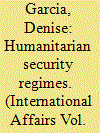

|
|
|
|
|
| Summary/Abstract |
This article introduces a novel concept, humanitarian security regimes, and enquires under what conditions they arise and what is distinctive about them. Humanitarian security regimes are driven by altruistic imperatives aiming to prohibit and restrict behaviour, impede lethal technology or ban categories of weapons through disarmament treaties; they embrace humanitarian perspectives that seek to prevent civilian casualties, precluding harmful behavior, protecting and ensuring the rights of victims and survivors of armed violence. The article explores how these regimes appear in the security area, usually in opposition to the aspirations of the most powerful states. The existing regimes literature has mostly taken a functional approach to analyzing cooperation, lacks a humanitarian hypothesis and does not explore the emergence of new regimes in the core area of security. The author argues that in the processes of humanitarian security regime-making, it is the national interest that is restructured to incorporate new normative understandings that then become part of the new national security aspirations. This article intends to fill this gap and its importance rests on three reasons. First, security areas that were previously considered to be the exclusive domain of states have now been the focus of change by actors beyond the state. Second, states have embraced changes to domains close to their national security (e.g. arms) mostly cognizant of humanitarian concerns. Third, states are compelled to re-evaluate their national interests motivated by a clear humanitarian impetus. Three conditions for the emergence of humanitarian security regimes are explained: marginalization and delegitimization; multilevel agency, and reputational concerns.
|
|
|
|
|
|
|
|
|
|
|
|
|
|
|
|
| 10 |
ID:
186647


|
|
|
|
|
| Summary/Abstract |
We draw on new and original data to examine both partisan and systemic inequities that have fueled the spread of COVID-19 in Native America. We show how continued political marginalization of Native Americans has compounded longstanding inequalities and endangered the lives of Native peoples. Native nations have experienced disproportionate effects from prior health epidemics and pandemics, and in 2020, Native communities have seen greater rates of infection, hospitalization, and death from COVID-19. We find that Native nations have more COVID-19 cases if they are located in states with a higher ratio of Trump supporters and reside in states with Republican governors. Where there is longstanding marginalization, measured by lack of clean water on tribal lands and health information in Native languages, we find more COVID-19 cases. Federal law enables non-members to flout tribal health regulations while on tribal lands, and correspondingly, we find that COVID-19 cases rise when non-members travel onto tribal lands. Our findings engage the literatures on Native American politics, health policy within U.S. federalism, and structural health inequalities, and should be of interest to both scholars and practitioners interested in understanding COVID-19 outcomes across Tribes in the United States.
|
|
|
|
|
|
|
|
|
|
|
|
|
|
|
|
| 11 |
ID:
127138


|
|
|
|
|
| Summary/Abstract |
In the post-Mao era from the 1980s, market reforms have seen profit-led neoliberal forces being introduced into China's urban spatial movements. In supporting such movements, labour mobility is allowed but the hukou system has been retained to prevent urban informality and slum formation and to control municipal public expenses. Without residency permits granted by the host cities, low-wage rural migrants enjoy little 'right to the city' and are deprived of local welfare and benefits. They often become 'drifting tenants', frequently driven by urban renewal, rising rentals and change of jobs. This study examines the spatial effect of causes (residency system) and consequences (frequent shifts in residence) experienced by low-skilled and low-wage migrants. A survey was conducted from February to mid-April 2011 in northwestern Beijing's Great Zhongguancun area which shows the marginalised state of displaced migrant tenants. This includes their adaptations to change, the pattern, causes and history of their intra-city mobility.
|
|
|
|
|
|
|
|
|
|
|
|
|
|
|
|
| 12 |
ID:
167384
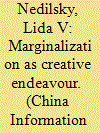

|
|
|
|
|
| Summary/Abstract |
Creative work is best understood as a process of getting lost. Scholarly work is a creative endeavour. And an endeavour requires total attention. On a superficial level, total attention is a demonstration of scholarly seriousness and discipline. On a deeper level, total attention is a necessary effort for successful scholarship. Yet, do we as scholars see getting lost as a necessary precondition for total attention? The authors whose works are showcased in this special issue of China Information add to our appreciation of marginalization as creative endeavour. They do so by means of scholarship highlighting the creation of marginal existence through the application of labels and locators that stick and shift. They do so, moreover, because of their willingness to share their particular experience of getting lost. That experience includes challenges to professional and personal identity when their own status – whether religious, racial, ethnic, or sexual – is called into question.
|
|
|
|
|
|
|
|
|
|
|
|
|
|
|
|
| 13 |
ID:
142366
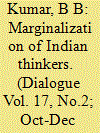

|
|
|
| 14 |
ID:
182490
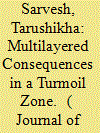

|
|
|
|
|
| Summary/Abstract |
Kashmir in the popular imagination is seen through the lens of excessively securitized and state-centric narratives that cast a shadow over the struggles of everyday life in Kashmir. An overriding climate of conflict, natural disasters, untimely snowfall and loss of tourism (one of the mainstays of Kashmir’s economy) have phenomenally shrunk people’s choices. Weak state institutions have induced a feeling of alienation among the Kashmiri people. This qualitative study attempts to look beyond the meta-narratives of conflict and brings out micro narratives of people’s lived experiences in a turmoil zone, radiating both at the inter-generational and intra-generational level, which is eclipsed in Kashmir.
|
|
|
|
|
|
|
|
|
|
|
|
|
|
|
|
| 15 |
ID:
178392
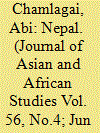

|
|
|
|
|
| Summary/Abstract |
The purpose of this article is to compare Nepal’s two Tarai/Madhesh Movements using the political opportunity structure theory of social movements. Tarai/Madhesh Movement I launched by the Forum for Madheshi People’s Rights in 2007 became successful as Nepal became a federal state. Tarai/Madhesh Movement II launched by the United Democratic Madheshi Front of the Tarai/Madheshi parties and the Tharuhat Joint Struggle Committee of the Tharu organizations failed as political elites disagreed about the need to create two provinces in the Tarai/Madhesh. While Tarai/Madhesh Movement II confirms that a social movement is more likely to fail when political elites align against it, Tarai/Madhesh Movement II refutes the theoretical proposition. Tarai/Madhesh Movement I suggests that the sucess of a social movement is more likely despite the alignment of political elites against it if its central demand consistently sustains the support of its constituents.
|
|
|
|
|
|
|
|
|
|
|
|
|
|
|
|
| 16 |
ID:
112102
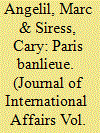

|
|
|
|
|
| Publication |
2012.
|
| Summary/Abstract |
Debates on contemporary urban conditions often center on the periphery of the city where an ever-increasing proportion of the urban population is forced to live. This article focuses on the banlieue-the periphery of Paris-as a model for the breakdown of the spatial order in cities globally. We examine how France's urban planning, guided by political and economic influences, has created and sustained banlieue poverty and marginalization. With rising anxieties about civil disorder in Paris resulting from the spatial inequities and cultural stigma toward the banlieue, it is now generally agreed that the city's historical planning policies have failed. We argue that any attempt to allocate space within a city equitably cannot emanate from the city center alone, but must also come from the marginalized periphery, which is equally a part of the system.
|
|
|
|
|
|
|
|
|
|
|
|
|
|
|
|
| 17 |
ID:
053947


|
|
|
| 18 |
ID:
112110
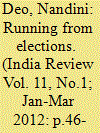

|
|
|
|
|
| Publication |
2012.
|
| Summary/Abstract |
The first wave of feminism in India was closely connected to electoral politics, while the second wave turned away from party politics. This resulted in a growing marginalization of feminist concerns from the public agenda. There is a strong relationship between movement success and electoral engagement. This article reviews the history of feminist interventions in electoral politics and demonstrates that early victories for women depended on their participation in party politics. I argue that the creation of the autonomous women's movement has had a diminishing effect on women's progress in recent years. A number of paths remain available to the women's movement to engage with political parties and political leaders. Staying outside the electoral arena has not served Indian feminism well.
|
|
|
|
|
|
|
|
|
|
|
|
|
|
|
|
| 19 |
ID:
101607
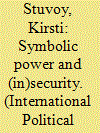

|
|
|
|
|
| Publication |
2010.
|
| Summary/Abstract |
The general role of symbolic power in contributing to the legitimacy of security has been acknowledged, and this article seeks, more specifically, to advance the understanding of gendered power dynamics and (in)security. It demonstrates how, through their first decade of existence, nonstate crisis centers in Northwest Russia contributed to security but also to the (unintentional) marginalization of women's security. Their emphasis on victims acting on their own behalf, inducing them to becoming acting subjects, is a misrecognition of the effect of symbolic power in this field. The refusal by the Russian (patriarchal) legislature of anti-domestic violence law, combined with the hesitancy of public institutions' personnel (doctors, police, judges) to provide support for women, gives the local crisis centers, which lacked financial resources, little choice about which intervention strategies to prioritize while emphasizing women's personal responsibility.
|
|
|
|
|
|
|
|
|
|
|
|
|
|
|
|
| 20 |
ID:
140205
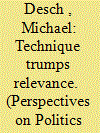

|
|
|
|
|
| Summary/Abstract |
I explain here the disconnect between our discipline's self-image as balancing rigor with relevance with the reality of how we actually conduct our scholarship most of the time. To do so, I account for variation in social scientists' willingness to engage in policy-relevant scholarship over time. My theory is that social science, at least as it has been practiced in the United States since the early twentieth century, has tried to balance two impulses: To be a rigorous science and a relevant social enterprise. The problem is that there are sometimes tensions between these two objectives. First, historically the most useful policy-relevant social science work in the area of national security affairs has been interdisciplinary in nature, and this cuts against the increasingly rigid disciplinary siloes in the modern academy. Second, as sociologist Thomas Gieryn puts it, there is “in science, an unyielding tension between basic and applied research, and between the empirical and theoretical aspects of inquiry.” During wartime, the tensions between these two impulses have been generally muted, especially among those disciplines of direct relevance to the war effort; in peacetime, they reemerge and there are a variety of powerful institutional incentives within academe to resolve them in favor of a narrow definition of rigor that excludes relevance. My objective is to document how these trends in political science are marginalizing the sub-field of security studies, which has historically sought both scholarly rigor and real-world relevance.
|
|
|
|
|
|
|
|
|
|
|
|
|
|
|
|
|
|
|
|
|